Share this
Maximizing Business Performance With Mobile Technology
by DefinIT on May 22, 2024
Business mobile device management (MDM) helps organizations secure and manage their mobile devices. Mobile application management is another key feature of top MDM solutions, allowing IT teams to control and secure apps on mobile devices. MDM allows IT teams to monitor devices, enforce security policies, and protect sensitive data. In this article, we will explore the top MDM solutions for 2024, their features, and how they can benefit your business.
Key Takeaways
-
Mobile Device Management (MDM) solutions are essential for businesses to secure and manage mobile devices, preventing data breaches and enhancing productivity, especially in remote working environments.
-
Effective MDM systems feature centralized management, robust security protocols, device enrollment, and the ability to support various operating systems; they help organizations enforce policies, monitor compliance, and conduct remote troubleshooting.
-
Choosing the right MDM solution involves evaluating features, pricing plans, and scalability to align with specific business needs and ensure effective device management and security.
Understanding Business Mobile Device Management (MDM)
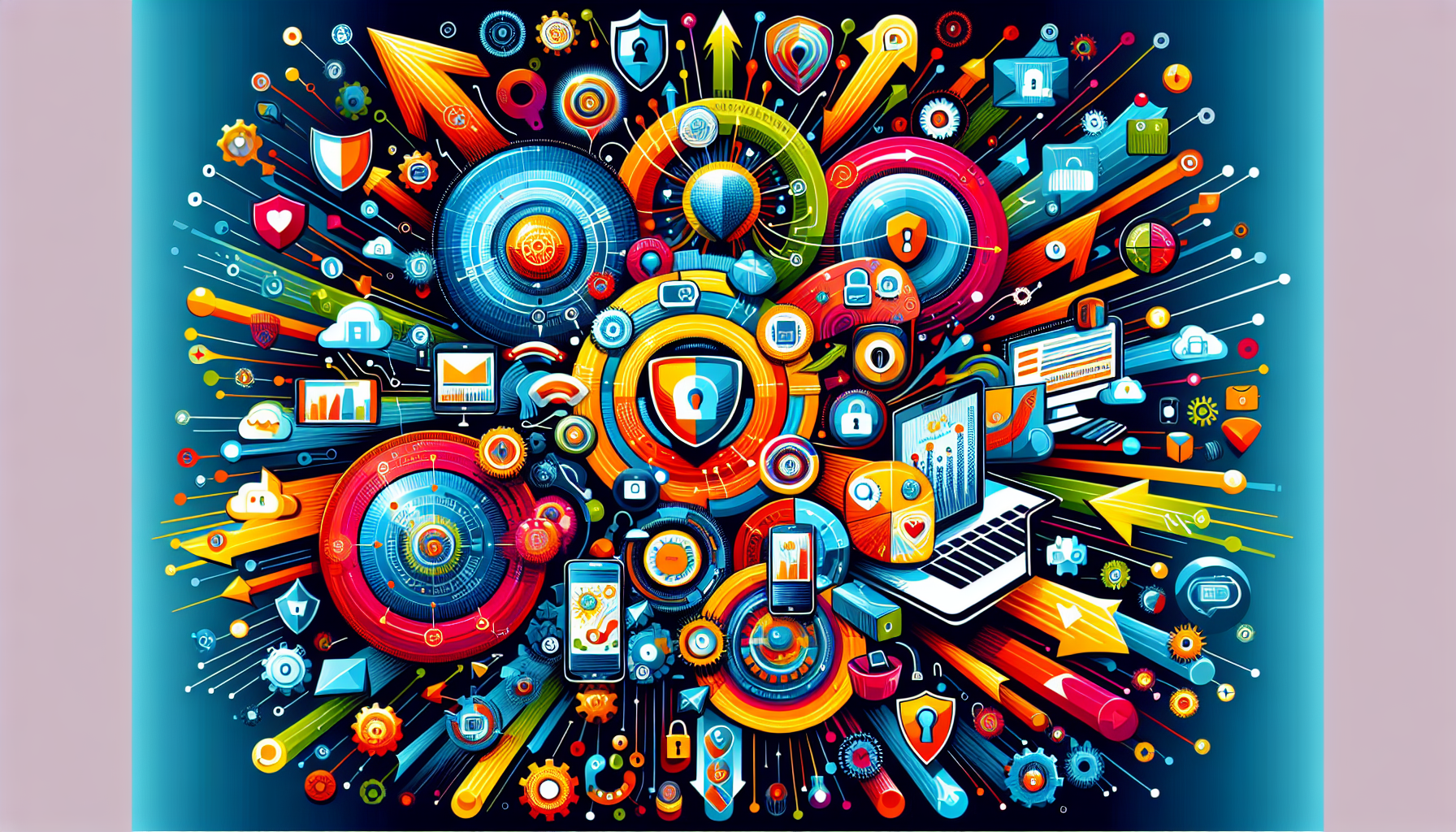
Mobile Device Management (MDM) enables businesses to securely oversee all the mobile devices within their operations, offering a framework to enforce security policies and manage device lifecycles using a mobile device manager.
MDM functionalities such as device tracking, remote wipe, application management, and policy enforcement are vital for protecting corporate data and boosting productivity across organizations. Mobile threat defense is also a critical component of MDM functionalities.
What is Business Mobile Device Management?
Mobile Device Management (MDM) software manages mobile devices and their security. These solutions allow IT and security teams to monitor, manage, and secure devices, streamlining the onboarding process with necessary apps, settings, and security configurations from a central console, with mobile security being a key aspect managed by MDM software.
Recent MDM platforms incorporate features like AI tools for device behavior analysis and a zero trust security model, providing comprehensive management for both personal and corporate-issued devices across different operating systems.
Why Businesses Need MDM Solutions
Managing mobile devices that access critical business information is essential to prevent data breaches, theft, or loss, including risks associated with lost or stolen devices and personal devices. Data loss prevention is a key benefit of using MDM solutions. A compromised device can allow attackers to access user accounts and sensitive data, posing significant security risks.
Organizations with a high percentage of remote workers benefit the most from implementing MDM solutions, as they enhance security measures and ensure the protection of business-critical data.
How Business MDM Solutions Work
MDM solutions offer a cloud-based platform for monitoring behaviors and securing business-critical data on enrolled devices, providing a unified view for IT and security teams to manage and monitor usage effectively with an endpoint management solution. Device compliance is a key feature of MDM solutions, ensuring that all devices adhere to company policies and security standards.
By ensuring devices run optimally and automating management tasks, MDM solutions enhance productivity and efficiency across organizations.
Centralized Device Management
A centralized management console enables efficient oversight of all connected devices within a corporate network. This solution offers a dashboard for real-time insights into device health and performance, allowing IT administrators to manage devices remotely, perform remote configuration, and ensure security and compliance across platforms, including unified endpoint management.
Companies manage mobile devices remotely via a central console, simplifying onboarding through automated services like Apple Business Manager and Google Zero-Touch Enrollment. Maintaining a real-time device inventory aids in asset management and recovery, protecting devices and streamlining configurations.
Policy Enforcement
A comprehensive MDM solution enables IT departments to manage devices across various operating systems within a corporate framework, enhancing control and visibility. Flexible policy enforcement, including robust security policies, and remote configuration are crucial for ensuring compliance, minimizing administrative workload, and reducing the potential for human errors that can lead to security vulnerabilities.
Remote Troubleshooting
Remote management capabilities, including remote access, allow IT admins to oversee mobile devices from any location. Once the MDM agent is installed, it monitors the device’s health and security posture to detect issues early.
MDM tools provide capabilities such as tracking, monitoring, troubleshooting, wiping device data, and even real-time screen viewing for effective remote troubleshooting.
Key Features of Effective Business MDM Solutions
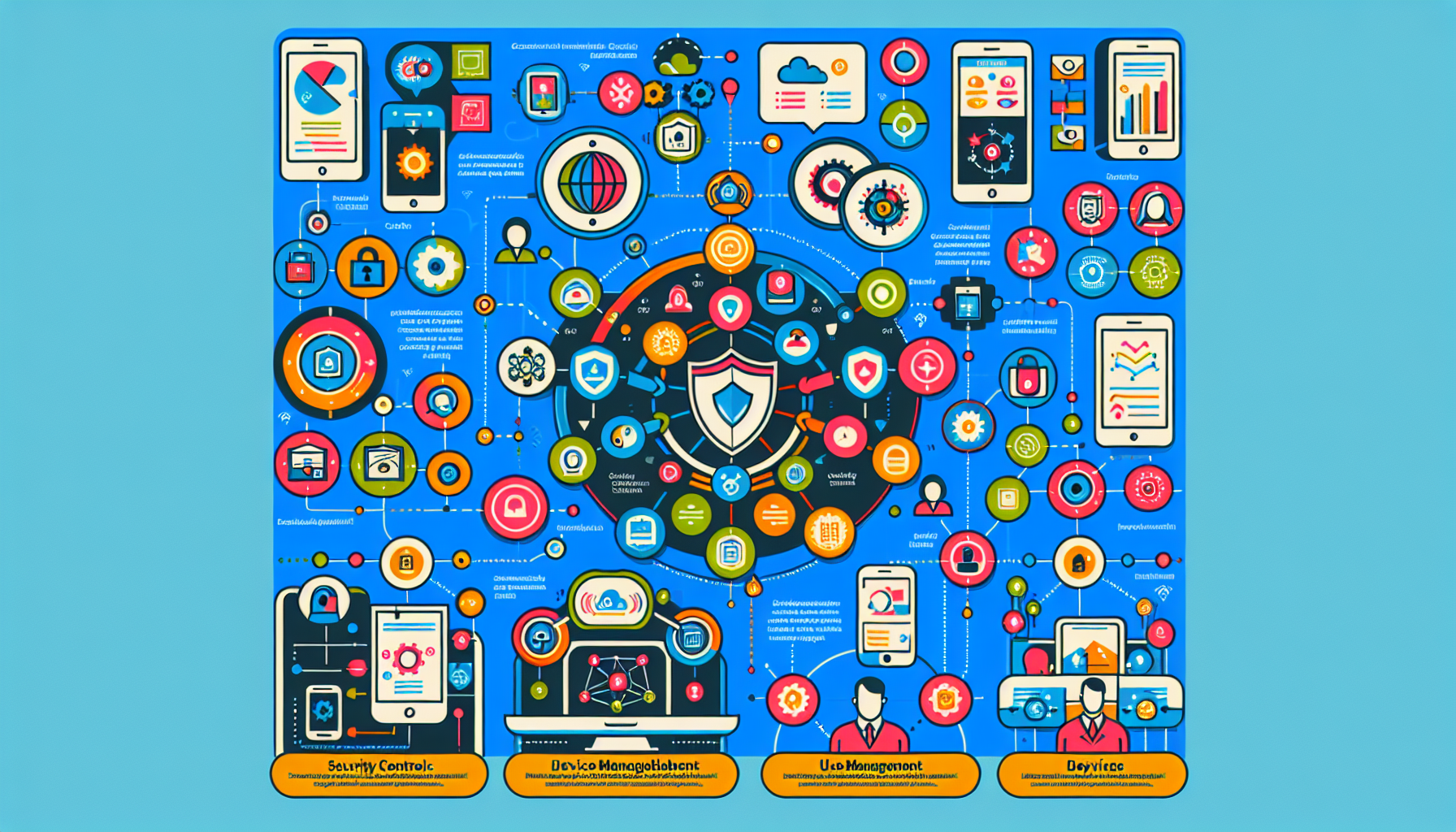
MDM solutions centralize control, enabling administrators to enforce security measures and manage configurations remotely. Essential features vary by solution but should meet specific use cases, ensuring robust reporting to monitor security, ensure compliance, and provide insights. Device lifecycle management is also an essential feature of effective MDM solutions.
Security Controls
Endpoint security is a vital aspect of robust security protocols in MDM solutions, including encryption and remote wipe, for protecting sensitive data. Protecting data movement from corporate to personal accounts is crucial. Strong MDM solutions offer additional safeguards against malware, MitM attacks, unsecured WiFi, and device theft.
The zero trust security strategy includes multi-factor authentication, encryption, device posture assessment, and conditional access, requiring continuous identity and context verification. Common MDM security features include policy-based security, device locking with PINs, and behavior restrictions, enabling IT teams to enhance security by remotely managing devices and applying context-based policies.
Device Compatibility
A key feature of an MDM solution is cross-platform support, ensuring compatibility with various operating systems and seamless integration with existing enterprise software. Ivanti Neurons for MDM offers a unified platform to manage multiple device types, including iOS, Android, and Windows, enabling bulk enrollment of personal and company devices with flexible options.
User Management
User authentication is crucial for managing user permissions within MDM solutions. Self-service options empower users to customize device profiles, enhancing productivity. Effective user authentication and identity management ensure secure access and proper management of roles and permissions.
Leading MDM Solutions for Businesses
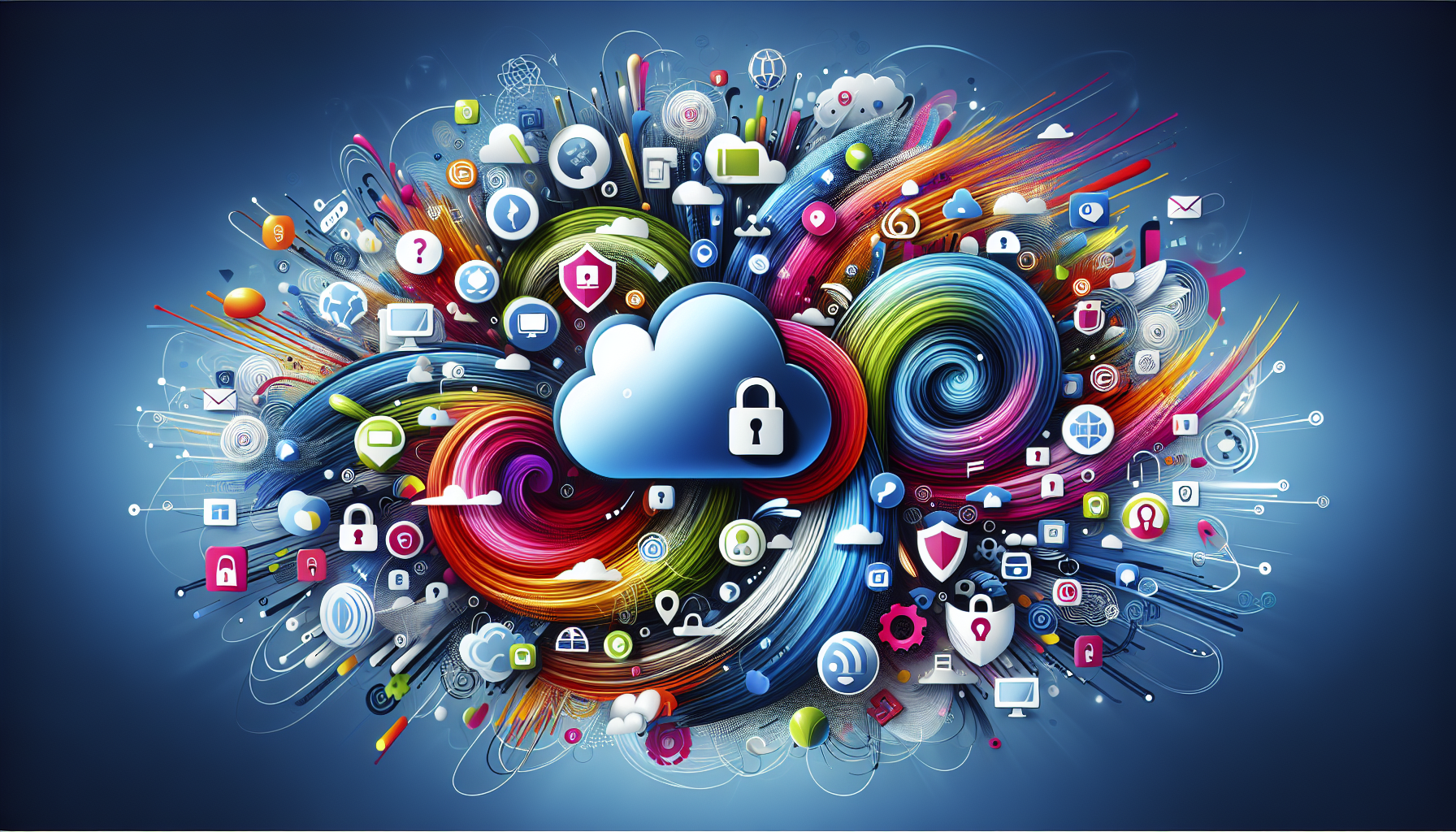
Mobile Device Management (MDM) solutions play a critical role in ensuring secure and efficient management of mobile devices in business environments. Leading MDM solutions like IBM Security MaaS360, Ivanti Neurons for MDM, and Apple Business Manager provide unique features and benefits that cater to different business needs, from advanced security measures to seamless integration and user-friendly management consoles, including enterprise mobility management. Mobile device security is a critical feature of leading MDM solutions.
IBM Security MaaS360
IBM Security MaaS360 is a comprehensive mobile device management solution that integrates security and management capabilities, allowing organizations to manage mobile devices and applications seamlessly. MaaS360 offers a cloud-based management platform that simplifies deployment and maintenance, making it ideal for organizations with a diverse range of devices.
Unique features include AI-driven insights, a user-friendly dashboard, and a robust app management system to enhance security, boost employee productivity, and reduce operational costs.
Ivanti Neurons for MDM
Ivanti Neurons for MDM provides a platform that enables secure and efficient management of mobile devices within a business context. The platform supports secure connectivity, enabling authorized apps to access corporate resources without user intervention, making it a reliable choice for businesses seeking proactive device management capabilities and seamless integration across platforms.
Apple Business Manager
Apple Business Manager supports bulk enrollment and bulk purchasing of apps and books, facilitating easy assignment and management across devices. Managed Apple IDs created through Apple Business Manager provide control over user access to organizational resources, ensuring high standards of information security and privacy for its services.
This platform plays a crucial role in enhancing mobile device management (MDM) solutions tailored for Apple devices.
Benefits of Implementing MDM in Your Business
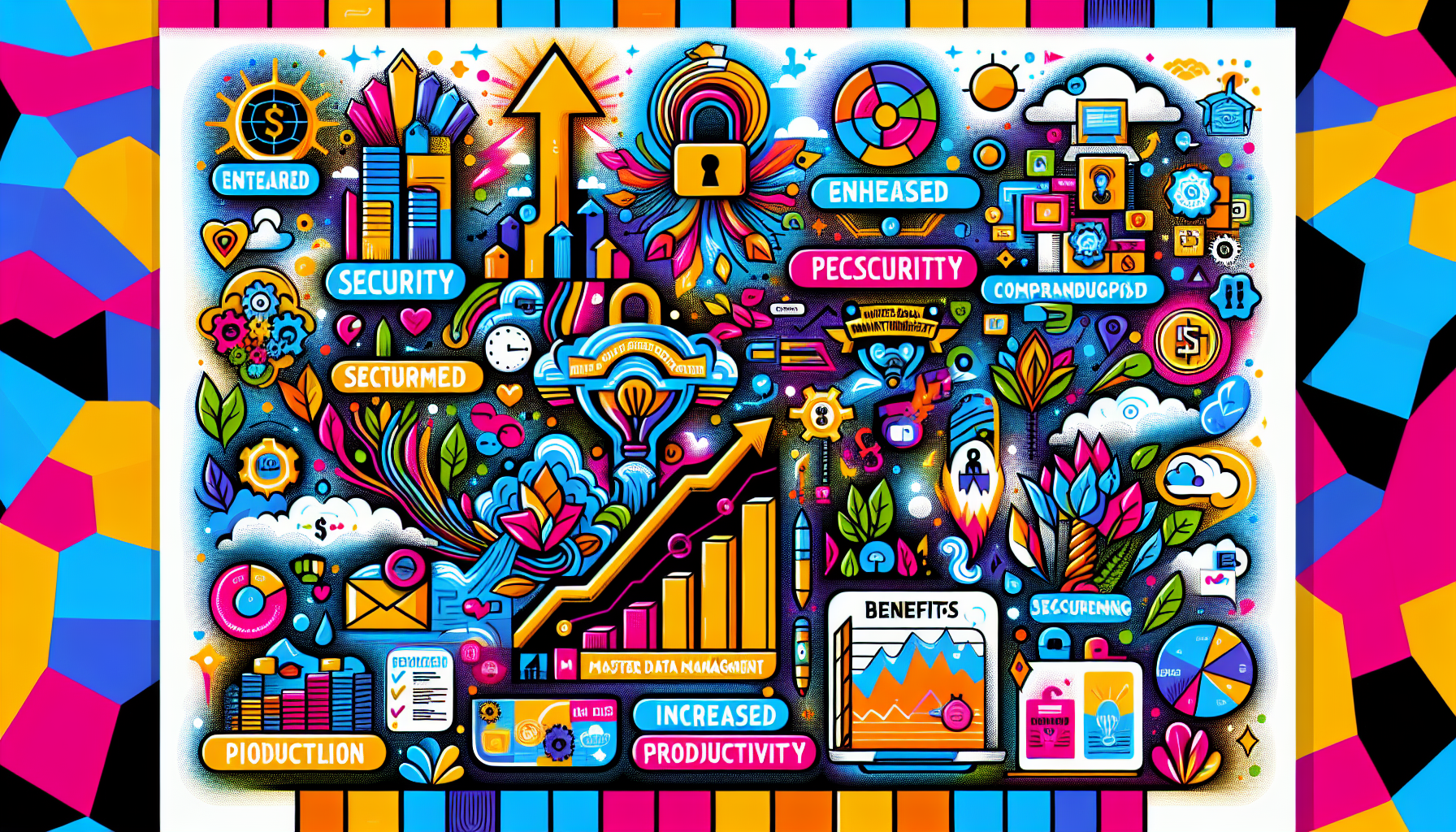
MDM is essential for organizations as mobile devices become integral for productivity and efficiency, especially in remote working environments. The choice of MDM provider significantly influences the capabilities of the solution and the effectiveness of management workflows. MDM solutions provide significant benefits in remote work by enhancing productivity and security.
Establishing a comprehensive MDM policy is crucial for safeguarding mobile devices against security threats and ensuring employees understand usage guidelines.
Enhanced Security
MDM serves as a methodology that helps organizations provision and secure mobile devices while enhancing workforce productivity. MDM solutions utilize security policies to safeguard devices from potential malware and cyber threats, including features like multi-factor authentication and data encryption to enhance security. By restricting unauthorized access and enforcing compliance with security protocols, MDM solutions significantly reduce the risk of security breaches and protect corporate data.
Centralized monitoring through MDM helps businesses track device compliance and usage, addressing any suspicious activity promptly.
Increased Productivity
MDM solutions help enhance user productivity by distributing, managing applications, and application management on mobile devices. User-centric management through self-service options and customized profiles reduces distractions and allows employees to focus on their tasks.
By ensuring a seamless user experience across any device and operating system, MDM solutions promote efficiency and provide continuous feedback mechanisms for improving user experience.
Cost Efficiency
Using MDM can lead to significant cost savings through resource optimization and facilitating remote work setups. Flexible pricing plans offered by MDM providers allow businesses to find budget-friendly options that meet their specific needs, ensuring that the investment in MDM solutions translates into long-term financial benefits and enhanced user productivity.
Choosing the Right MDM Solution for Your Business
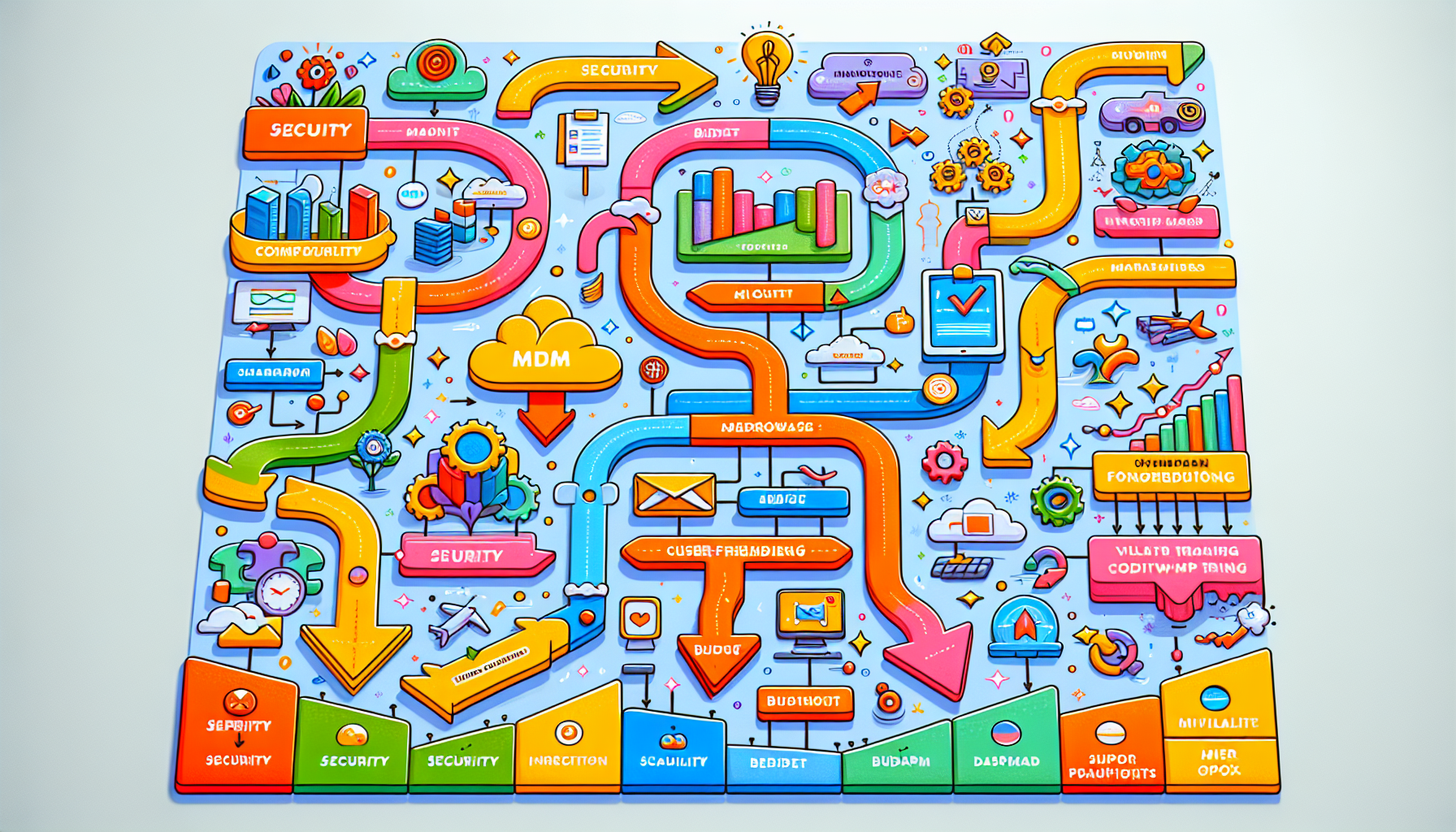
Effective MDM implementation begins with a thorough assessment of existing IT infrastructure and aligning MDM goals with business objectives. Implementing effective MDM solutions requires clear objectives and policies tailored to the organization’s needs, ensuring that the chosen solution aligns with the business’s specific requirements for device management and security. Additionally, scalability is a key factor to consider when choosing an MDM solution.
Evaluating Features
Determining organizational goals and device management needs is crucial for selecting an MDM solution. It is essential to check device compatibility before investing in an MDM solution to avoid security gaps and ensure visibility over every device.
Key features administrators look for in MDM software include a dashboard that provides easy access to key information and capabilities that ease device enrollment, such as using a specific URL or QR code.
Pricing Plans
Understanding the various pricing structures of MDM solutions with a focus on cost-effectiveness helps in finding a budget-friendly option. MDM pricing models can vary significantly, often charging on a per-device or per-user basis, depending on the chosen vendor. The average cost of Mobile Device Management typically ranges from $3.25 to $9 per device monthly.
When determining pricing, consider not only the MDM cost but also potential expenses for add-on products.
Scalability
It is crucial to choose an MDM solution that can adapt to your business’s growth and evolving needs, with future-proofing as a crucial aspect. A scalable MDM solution can manage an increasing number and variety of devices as your organization expands.
Regular evaluations of MDM strategies are essential for scaling operations and adjusting to ensure ongoing effectiveness. Ongoing compliance checks and audits of MDM policies are critical to identify and rectify any deviations promptly.
Best Practices for MDM Implementation
Effective MDM implementation requires a structured approach, integrating key policies and best practices to ensure a smooth process. This section will outline the best practices for MDM implementation, focusing on planning and strategy, employee training, and continuous monitoring to maximize the benefits of MDM solutions. Policy enforcement is also a key aspect of effective MDM implementation.
Planning and Strategy
A successful MDM strategy should begin with a clear understanding of specific business needs and the identification of critical data elements. Identifying key stakeholders, ensuring stakeholder engagement, and outlining roles and responsibilities for managing mobile devices are essential steps in defining the scope of the MDM policy.
A phased approach to MDM deployment can help prioritize immediate needs while allowing flexibility to adapt to changing business priorities.
Employee Training
User training on MDM tools ensures employees can effectively utilize managed devices and understand the associated policies. Training increases engagement and promotes a better understanding of the technology’s benefits, improving their ability to use devices securely and efficiently.
Effective training leads to better adherence to security protocols and maximizes the potential of managed devices.
Continuous Monitoring
Continuous monitoring in Mobile Device Management (MDM) allows organizations to adapt to emerging threats, maintain regulatory compliance, and ensure effective compliance monitoring. Ongoing monitoring helps businesses identify security vulnerabilities and respond proactively to protect sensitive data.
Regular updates to MDM policies are crucial as they reflect the latest security landscapes and compliance requirements. Overall, continuous monitoring and updating of MDM configurations are essential for maintaining robust security measures and efficient device management.
Summary
In conclusion, Mobile Device Management (MDM) solutions are indispensable for modern businesses, ensuring secure, efficient, and productive device management of mobile devices. By understanding the various functionalities and benefits of MDM, businesses can make informed decisions and choose the right solution tailored to their needs. Implementing best practices and continuous monitoring will further enhance the effectiveness of MDM solutions, safeguarding business-critical data and optimizing operations. Embrace the power of MDM to secure your digital future and propel your business towards greater success.
Frequently Asked Questions
What is Mobile Device Management (MDM)?
Mobile Device Management (MDM) is a system that enables businesses to securely manage and monitor mobile devices, ensuring data protection and enhancing productivity. This technology is essential for maintaining security and efficiency in modern operations.
Why is MDM important for businesses?
MDM is essential for businesses as it enhances security by preventing data breaches and loss, particularly in environments with many remote workers. Implementing MDM ensures efficient management of mobile devices, safeguarding sensitive information.
How do MDM solutions enhance security?
MDM solutions enhance security by implementing robust protocols such as encryption, remote wipe capabilities, multi-factor authentication, and zero trust security models. These measures protect sensitive data and ensure the security of endpoints effectively.
What should I consider when choosing an MDM solution?
When selecting an MDM solution, it is essential to evaluate device compatibility, security features, pricing plans, and scalability to ensure that the solution effectively meets your business's requirements.
How do MDM solutions increase productivity?
MDM solutions enhance productivity by enabling efficient management of applications on mobile devices, facilitating self-service capabilities, and ensuring a consistent user experience across different platforms. This streamlined approach allows employees to work more effectively and efficiently.

